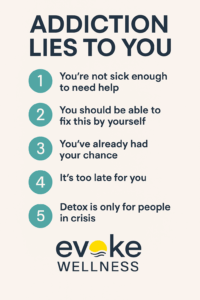When you first get sober, everything gets louder. Not just your thoughts—but the silence. The feelings. The stuff you used to outrun. And somewhere in all that noise, addiction keeps talking.
It doesn’t yell anymore. It whispers. Guilt in one ear. Doubt in the other. And if you’re not paying attention, those whispers start sounding like your own thoughts.
If you’ve just gotten sober and feel like you’re falling apart—or if you’re sober-curious but still scared—this is for you. Because even without substances, addiction still lies. And calling those lies out is part of getting free.
1. “You’re not sick enough to need help.”
Addiction convinces you that other people have it worse. That your problems are small. That if you’re not overdosing or homeless, you must be fine.
But being “not sick enough” is not a thing. You’re either struggling or you’re not. And if you’re asking whether you need help, that’s your answer.
You deserve care even if your life looks okay from the outside. Don’t let your pain be invisible just because it’s quiet.
2. “You should be able to fix this by yourself.”
This one hits especially hard for people who are high-functioning. You’ve always figured things out on your own. You don’t want to be “a burden.” You don’t want anyone to know you’re not okay.
But addiction feeds on isolation. It grows in silence. You don’t get extra points for suffering solo.
You wouldn’t try to set your own broken leg—so why treat emotional recovery any differently? Programs like drug detox in San Marcos, Texas exist for a reason: because healing works better when it’s shared.
3. “You’ve already had your chance.”
If you’ve tried to quit before—especially if you’ve been to treatment—this lie can feel crushing.
It says, “You blew it.”
It says, “You already used up your one shot.”
It says, “People won’t believe you again.”
But here’s the truth: healing doesn’t expire. You’re allowed to try again. And again. And again. Because every time you show up, something gets stronger. More honest. More possible.
You didn’t waste your last chance. You proved you’re still willing to fight for yourself.
4. “It’s too late for you.”
This one shows up in different forms: too old, too far gone, too many burned bridges.
But there is no clock running out on recovery. We’ve seen people start over in their 60s. We’ve seen people mend relationships they thought were unfixable. We’ve seen people reintroduce themselves to a life they thought was over.
The only thing it’s too late for? More pain. You don’t have to carry that anymore.
5. “Detox is only for people in crisis.”
Let’s be real—“crisis” is subjective. Just because you’re still holding down a job or paying rent doesn’t mean your mind and body aren’t suffering.
You don’t need to hit rock bottom to benefit from drug detox. In fact, early intervention often makes recovery smoother, safer, and more sustainable.
You’re allowed to ask for help before it becomes an emergency.
6. “You’ll be alone there.”
Addiction isolates. And even in recovery, loneliness can be suffocating.
It’s tempting to think detox means sitting in a cold room with strangers who don’t understand you. But at a place like Evoke Wellness TX, that couldn’t be further from the truth.
You’ll meet people who know what it’s like to feel scared and raw and unsure. You’ll be surrounded by staff who treat you with compassion, not judgment.
And for the first time in a while, you might feel less alone—not more.
7. “It’s going to flatten who you are.”
If you’ve used to cope with anxiety, creativity, or social pressure, this one’s personal.
You may believe that drugs or alcohol helped you feel more like you. More interesting. More in control. More alive.
But real recovery doesn’t erase your personality. It reveals it. It gives you access to emotions and expressions you didn’t realize you’d muted.
Detox won’t take away your spark. It’ll help you find the parts that got buried.
8. “People will judge you.”
This lie banks on shame. It tells you that if you ask for help—especially something like detox—people will roll their eyes. Walk away. Label you.
But here’s what we know: the people who love you want you alive. They want you safe. And anyone who judges you for choosing healing isn’t someone you need advice from anyway.
At Evoke Wellness TX, you’re met with respect. No labels. No stigma. Just real support.
9. “You’ll disappoint everyone if they know the truth.”
You may feel like admitting how bad it is will break your family. Or confirm their worst fears.
But honesty doesn’t disappoint people—it gives them a chance to help you for real.
People already know something’s off. Letting them in allows them to stop worrying in silence and start walking with you toward healing.
You’re not a disappointment. You’re human. And brave.
10. “You’re too much.”
Too intense. Too needy. Too angry. Too broken. This lie shows up early and sticks around.
But the truth? You’re not too much. You just haven’t had enough of what you needed: safety, support, space to feel.
In early recovery, everything feels big. You feel big. And that’s not a flaw. It’s a sign you’re thawing out.
You’re not too much. You’re just un-numbing.
Frequently Asked Questions About Drug Detox in San Marcos
What is drug detox, and why is it necessary?
Drug detox is the medically supervised process of clearing substances from your body. It helps manage withdrawal symptoms safely and is often the first step toward sustainable recovery.
Do I have to be using heavily to go into detox?
Not at all. Even if your use has slowed or stopped, detox can help stabilize you physically and mentally so you can begin the next phase of healing with clarity.
How long does detox take?
Detox typically lasts 5–10 days, depending on the substance, your history, and your health. At Evoke Wellness TX, we tailor the process to fit your needs.
Is detox painful?
Withdrawal can be uncomfortable—but with medical support, it’s far safer and more manageable. We offer medications and compassionate care to reduce symptoms and help you feel secure.
What happens after detox?
After detox, many people transition into residential or outpatient treatment. Our team helps build a custom plan for what comes next, whether it’s therapy, peer support, or structured recovery programming.
Still hearing the lies? Let us be louder.
Call (888) 450-2285 or visit Contact Us to learn more about detox and early recovery support in San Marcos, Texas. You’re not too far gone. You’re just getting started—and we’re here when you’re ready.



